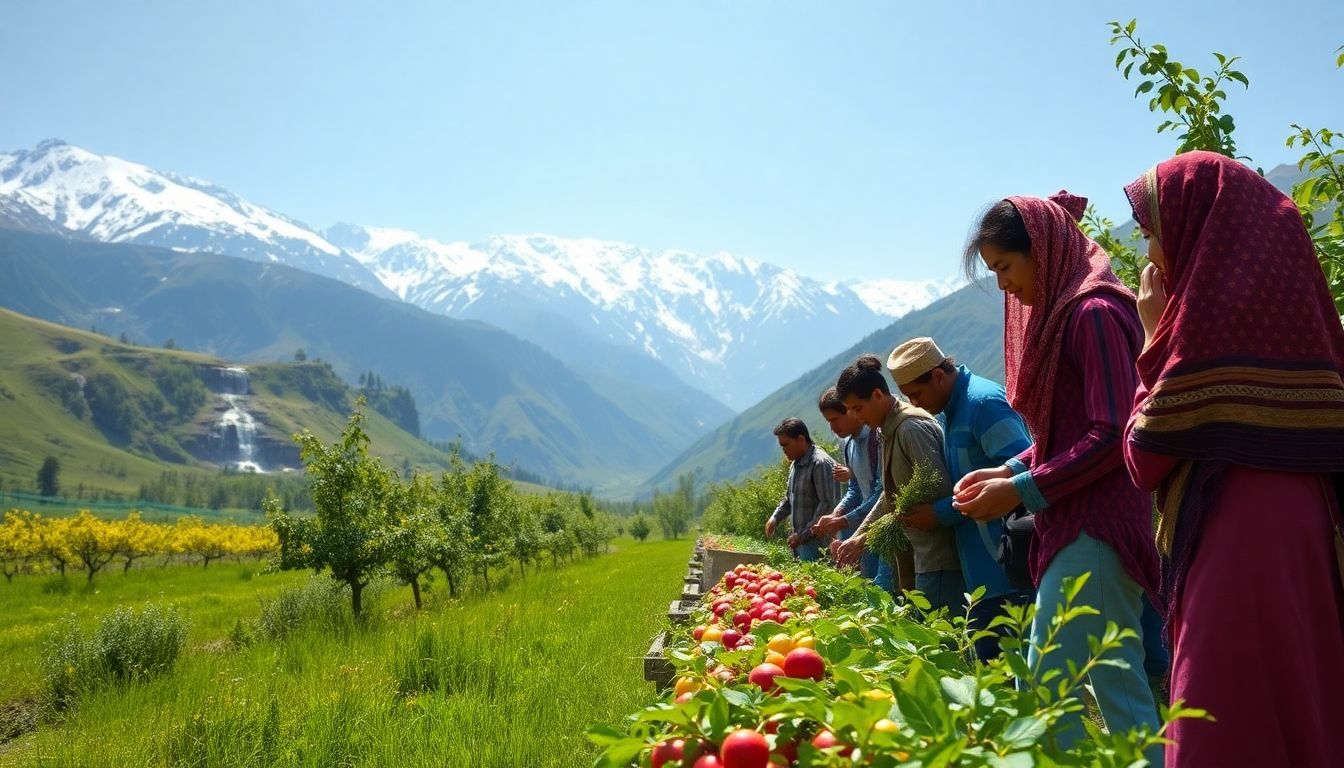
Hunza Valley's Organic Bounty: Shaping Global Health Trends
Introduction: A Paradise of Health and Longevity
The Hunza Valley is a captivating region nestled in the mountains of northern Pakistan. This breathtaking area is known for its awe-inspiring landscapes and unique lifestyle of its people. The Hunzakuts, the inhabitants of this valley, are often highlighted for their healthy living practices and exceptional longevity. It’s no secret that their organic agricultural offerings contribute significantly to their wellbeing.
The Hunza Valley’s commitment to organic farming and sustainable practices lays the foundation for a lifestyle that emphasizes health and vitality. As we explore the connection between Hunza’s organic bounty and global health trends, we gain insights into how this small region influences wellness far beyond its borders.
The Hunza Diet: A Foundation of Organic Living
Apricots and Beyond
A standout feature of Hunza’s organic offerings is its diverse agricultural produce. The valley is especially famous for its apricots, celebrated for their sweetness and nutritional benefits. However, apricots are just the tip of the iceberg. The Hunza diet includes a variety of organic fruits and vegetables, such as:
- Mulberries
- Cherries
- Beans
- Potatoes
This array of organic produce not only adds flavor but also guarantees a rich supply of vitamins and minerals essential for health.
Traditional Farming Practices
The agricultural practices in Hunza reflect a deep respect for nature. Farmers cultivate the land using methods that promote sustainability. These techniques include:
- Crop rotation: Helps maintain soil fertility and prevents pests.
- Natural pest control: Using beneficial insects instead of harsh chemicals.
- Companion planting: Planting different crops together for mutual benefit.
Such methods not only yield healthy produce but also support the local ecosystem.
Nutritional Powerhouse
The nutritional richness of the Hunza diet cannot be overstated. Foods grown in the valley are packed with antioxidants, vitamins, and minerals. The traditional diet, high in whole foods and low in processed items, supports both physical health and longevity. This emphasis on natural ingredients is increasingly attracting global attention.
Impact on Global Wellness Trends: The Rise of Organic Foods
The Organic Food Movement
In recent years, a significant shift toward organic food consumption has gained momentum worldwide. People are becoming more aware of the health benefits associated with organic eating. The Hunza Valley serves as a model for this movement, showcasing the impact of consuming nutrient-rich, organic foods.
Hunza's Influence on Western Diets
The findings from Hunza's dietary habits have started inspiring changes in Western diets. More individuals are exploring how organic foods can enhance their health. Increasingly, restaurants and health-conscious consumers are opting for organic offerings, mirroring the dietary choices of the Hunzakuts.
The Shift Towards Natural Remedies
A growing interest in natural and herbal medicine is also on the rise. With Hunza’s rich tradition of using local herbs and plants for health benefits, this shift encourages many to explore herbal alternatives for wellness.
Scientific Scrutiny: Research on Hunza's Organic Lifestyle
Studies on Hunza's Diet and Longevity
Research has been dedicated to studying the dietary habits and overall health of the Hunza people. Many findings suggest a direct correlation between their organic diet and exceptional lifespan. These studies highlight the importance of whole, unprocessed foods in achieving optimal health.
Analyzing the Impact of Organic Consumption
Numerous studies have demonstrated the health benefits associated with organic food consumption. Scientific evidence suggests that organic foods can lower the risk of chronic diseases. This is often attributed to higher levels of antioxidants found in organic produce.
Limitations of Research
While research provides valuable insights into the health benefits of the Hunza lifestyle, limitations exist. Some studies may have biases or lack comprehensive data on the specifics of the diet. Acknowledging these limitations is essential for a balanced view.
Challenges and Sustainability: Maintaining Organic Practices
Environmental Impact of Farming Practices
Organic farming in Hunza promotes biodiversity and enhances soil health. Compared to conventional farming, organic practices have a less damaging impact on the environment. Nonetheless, the challenge remains to sustain these practices in the face of growing demand.
Economic Challenges and Sustainable Agriculture
Maintaining organic farming can be economically challenging. Farmers in Hunza face pressures such as market fluctuations and the high cost of organic certification. Supporting local agriculture through fair trade practices can help address these issues.
The Future of Hunza's Organic Legacy
Looking ahead, the sustainability of Hunza's organic agriculture is crucial. With increasing interest in organic foods globally, there is potential for positive growth. Future generations of Hunzakuts can continue to share their organic heritage while contributing to global health trends.
Embracing the Hunza Approach: Tips for a Healthier Lifestyle
Incorporating Organic Foods into Your Diet
- Shop local: Look for farmers’ markets in your area.
- Grow your own: Start a small organic garden at home.
- Choose organic: Opt for organic products when grocery shopping.
Adopting Sustainable Living Practices
- Reduce waste: Use reusable containers and bags.
- Conserve water: Implement water-saving practices in your home.
- Support local agriculture: Buy from local farms or cooperative stores.
The Importance of Holistic Wellbeing
Health is not just about diet; it also encompasses mental and emotional well-being. Finding balance in life through mindfulness and physical activity can lead to a healthier lifestyle, similar to the holistic approach taken in Hunza.
Conclusion: Lessons from the Hunza Valley
Key Takeaways
The Hunza Valley serves as a powerful example of how organic living can enhance health and longevity. Its emphasis on organic agriculture, traditional practices, and natural remedies are lessons we can all embrace.
The Future of Organic Living
As global interest in organic lifestyles continues to rise, the future of health trends appears promising. By adopting practices inspired by Hunza, communities worldwide can foster healthier living habits.
Call to Action
Consider integrating more organic foods into your life and exploring sustainable practices. By making these small changes, you can embark on a journey towards better health and wellbeing, inspired by the practices of the remarkable Hunza Valley.